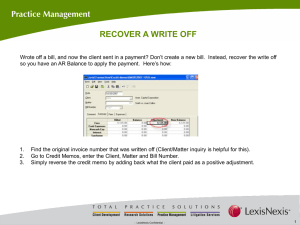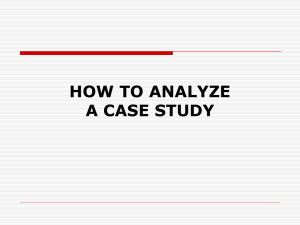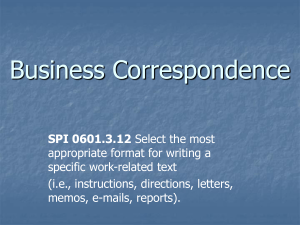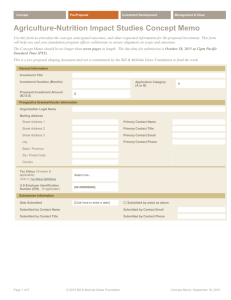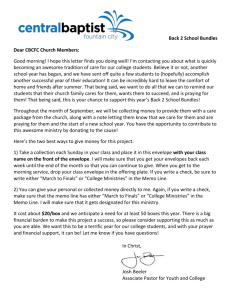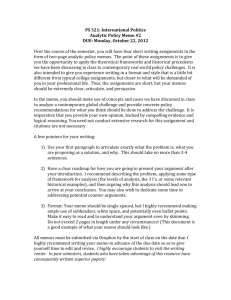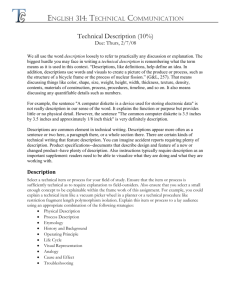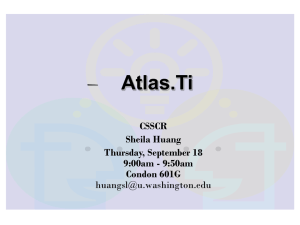680-SP13-Felder-20130114-095354
advertisement
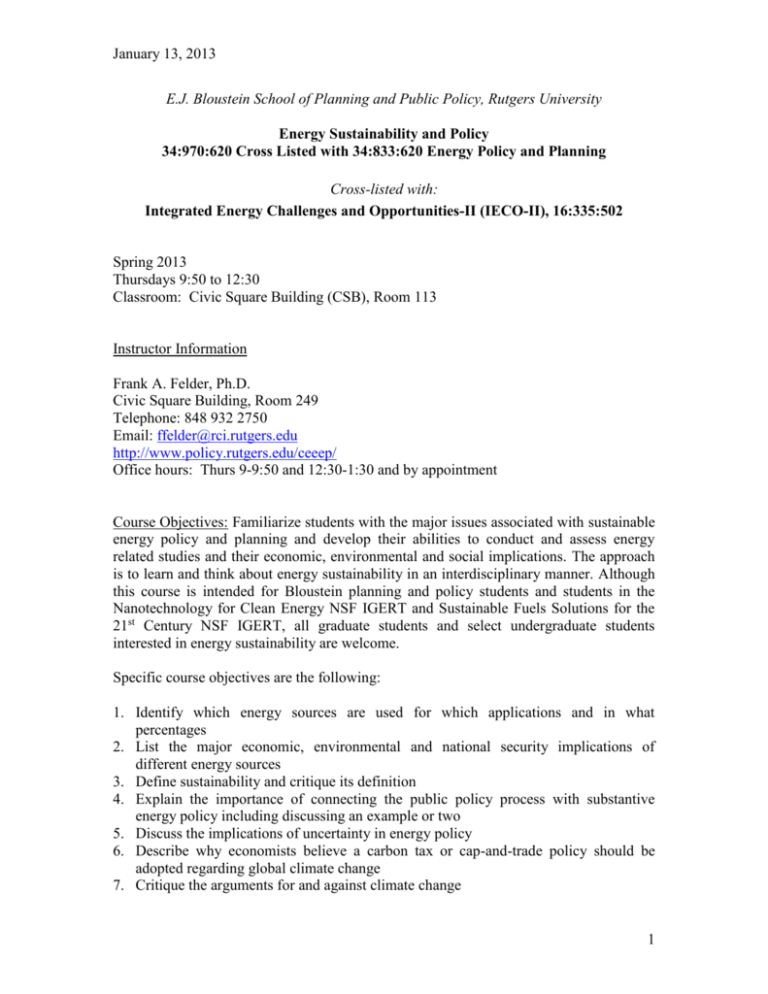
January 13, 2013 E.J. Bloustein School of Planning and Public Policy, Rutgers University Energy Sustainability and Policy 34:970:620 Cross Listed with 34:833:620 Energy Policy and Planning Cross-listed with: Integrated Energy Challenges and Opportunities-II (IECO-II), 16:335:502 Spring 2013 Thursdays 9:50 to 12:30 Classroom: Civic Square Building (CSB), Room 113 Instructor Information Frank A. Felder, Ph.D. Civic Square Building, Room 249 Telephone: 848 932 2750 Email: ffelder@rci.rutgers.edu http://www.policy.rutgers.edu/ceeep/ Office hours: Thurs 9-9:50 and 12:30-1:30 and by appointment Course Objectives: Familiarize students with the major issues associated with sustainable energy policy and planning and develop their abilities to conduct and assess energy related studies and their economic, environmental and social implications. The approach is to learn and think about energy sustainability in an interdisciplinary manner. Although this course is intended for Bloustein planning and policy students and students in the Nanotechnology for Clean Energy NSF IGERT and Sustainable Fuels Solutions for the 21st Century NSF IGERT, all graduate students and select undergraduate students interested in energy sustainability are welcome. Specific course objectives are the following: 1. Identify which energy sources are used for which applications and in what percentages 2. List the major economic, environmental and national security implications of different energy sources 3. Define sustainability and critique its definition 4. Explain the importance of connecting the public policy process with substantive energy policy including discussing an example or two 5. Discuss the implications of uncertainty in energy policy 6. Describe why economists believe a carbon tax or cap-and-trade policy should be adopted regarding global climate change 7. Critique the arguments for and against climate change 1 January 13, 2013 8. Perform unit conversion calculations 9. Describe the global energy system Course Description Energy sustainability and policy are critical components of state, national and international public policy and planning. Issues surrounding the reliability and security of energy supplies directly affect national domestic and foreign policy, as well as environmental, economic development and land use concerns. Moreover, the policies, strategies, and programs adopted by both the public and private sectors will directly impact upon our lives as professionals, members of a community, and our families. This graduate seminar course will examine energy sustainability and policy through a timely, critical and practical approach designed to give students an insight into the factors that shape energy policy. This class will be conducted as a mixture of lectures, classroom discussion, group meetings with the instructor, and a field trip to a nuclear power plant. Major topic areas include energy technologies, the nature and operation of energy markets, environmental issues, energy planning, interdisciplinary energy analysis, and the components of a holistic energy policy. Required Video Lectures Students are required to view the following lectures given by internationally recognized scholars available at http://web.mit.edu/mitei/news/video.html 1. Meeting US Energy and Climate Challenges With Rational Policy, Severin Borenstein 2. Why Bad Things Happen to Good Technologies, John Sterman 3. Uncertainties in Climate Forecasts: Causes, Magnitudes and Policy Implications, Stephen H. Schneider 4. Climate Change: The Economics of and Prospects for a Global Deal, Nicholas Stern 5. Talk and Action: The Role of International Negotiations in Addressing the Climate Challenge, Todd Stern Required and Recommended Readings Required and recommended readings are either available on the internet or on the course’s Sakai website https://sakai.rutgers.edu/portal The primary text for the seminar is Sustainable Energy – without the hot air by David JC MacKay (hereafter MacKay) available for free at: http://www.withouthotair.com/download.html 2 January 13, 2013 Academic Integrity All members of our community must be confident that each person's work has been responsibly and honorably acquired, developed, and presented. Any effort to gain advantage not given to all students is dishonest, whether or not the effort is successful. A violation of academic honesty is a breach of trust, and will result in penalties, including possible suspension or expulsion. When in doubt about plagiarism, paraphrasing, quoting, or collaboration, consult the course instructor. Please see: http://academicintegrity.rutgers.edu/students.shtml for further information. Schedule of Classes and Assignments ALL ASSIGNMENTS ARE DUE AT THE BEGINNING OF CLASS NOTE: Videos are not necessarily assigned in order from the list above. January 24 Class overview and introduction to energy policy and planning, energy trends, technologies, and implications KEY WORD: SUSTAINABILITY DUE: 1. READING MacKay: Part I. Numbers, Not Adjectives, Sections 1-2, pp. 1-28 2. READING: Haas, et al, Energy Policy, 36 (2008), 4012-4021 3. WATCH Video #1 KEY Questions Class 1: a) What is a definition of energy sustainability? b) What are the major categories of energy policy objectives? c) What are the major fuels used as sources of energy? d) What is the difference between energy and power? e) What are the major uses of energy? f) What are the major environmental implications of energy production and consumption? g) What are the major technologies that convert fuel into energy and deliver it to users? January 31 Energy Trends, Technologies and Implications, part 2 KEY WORD: UNITS DUE: 4. READING MacKay: Part I. Numbers, Not Adjectives, Sections 1-10, pp. 29-67 3 January 13, 2013 5. REVIEW MIT Energy Conversion list on Sakai 6. MEMO #1: Submit 800-word memo: Is energy sustainability a useful concept? Why or why not? KEY Questions Class 2: a) What are the major units of energy and power? b) Which units are used with which sources and uses of energy? c) Which units are used with which energy policy objectives? d) Which units are used for individual energy use, national and worldwide? e) Be able to perform simple unit analysis. February 7 Energy Trends, Technologies and Implications, part 3 KEY WORD: TECHNOLOGIES DUE: 7. READING MacKay: Part I. Numbers, Not Adjectives, Sections 1-10, pp. 68-112 8. READING Felder and Haut, Balancing Energy Alternatives, available on Sakai 9. MEMO #2: Submit draft energy log (spreadsheet) of your direct use of energy for one week KEY Questions Class 3: a) Compare the pro’s and con’s of various energy technologies (costs, environmental impacts, scalability, technological maturity, uses, etc.) b) Compare energy trends across selected countries. February 14 Energy Analysis, part 1 KEY WORD: SYSTEMS DUE: 10. READING MacKay: Part II. Making a Difference, Sections 19-24, pp. 68-176 11. WATCH Video #2 12. MEMO #3: Select an energy technology related to your research if possible and describe in 800 words some actual or possible unintended consequences of that technology KEY Questions Class 4: a) What is a system? What elements are in many systems and what are their definitions? b) What are the characteristics of the global energy system? Provide examples for each of these characteristics. February 21 NO CLASS (compensation time for field trip latter in the semester) 4 January 13, 2013 Energy Analysis, part 2 KEY WORD: UNCERTAINTIES DUE: 13. READING MacKay: Part II. Making a Difference, Sections 25-32, pp. 177-250 14. WATCH Video #3 KEY Questions Class 5: a) What are the major uncertainties related to energy policies and technologies? b) What are possible strategies policymakers can undertake to respond to uncertainty? c) What are the ways energy analysts can address uncertainties in their work? February 28 Climate Change I KEY WORD: SCIENCE DUE: 15. READING John Holdren, Meeting the Climate-Change Challenge, 2008 available on Sakai 16. MEMO #4: Submit final energy log of your direct use of energy incorporating estimates of uncertainty in your analysis KEY Questions Class 6: a) What are the major steps in the chain of reasoning that links increase in greenhouse gas emissions to changes in the global climate? b) What evidence supports each step? c) What counter evidence exists and what arguments are made that challenge the climate change chain of reasoning? d) What is climate change mitigation and adaptation? March 7 Climate Change II KEY WORD: EQUITY DUE: 17. READING IPCC Technical Summary on Sakai 18. MEMO #5: Submit 800-word memo on the implications of uncertainty in energy policies and plans KEY Questions Class 7: a) How are climate change impacts different across different regions of the world? b) What are the equity implications of different regional climate change impacts compared to regional emissions of greenhouse gases? March 14 Climate Change III 5 January 13, 2013 KEY WORD: ECONOMICS DUE: 19. READING Executive Summary of Nicolas Stern’s report on Sakai 20. WATCH Video 4 21. MEMO #6: Submit 1,200-word memo on whether climate change is the most important issue facing the globe KEY Questions Class 8: a) What are the key components and mechanics of cap-and-trade on greenhouse gases work? b) What are other categories of policy responses instead of cap-and-trade? c) Why do economists emphasize that it is important to have a price on greenhouse gases? d) What is leakage and why is it important in policy responses to climate change? March 28 Climate Change IV KEY WORD: POLITICS DUE: 22. WATCH Video 5 23. Read U.S. Supreme Court Case Massachusetts v. Environmental Protection Agency, 549 U.S. 497 (2007) majority opinion KEY Questions Class 9: a) What are several major areas of dispute among key nations regarding climate change? b) What is 1-2 sentence summary of the positions of the following continents/countries/regions: Africa, China, Europe, India, and the U.S. April 4 Energy Markets KEY WORD: EFFICIENCY DUE: 24. READ The U.S. Electric Power Sector and Climate Change Mitigation, Pew Center, 2005 KEY Questions Class 10: a) How much does the U.S. power sector contribute to U.S. greenhouse gas emissions? b) Describe how electricity is generated, transmitted and distributed. c) What is electric power industry restructuring? d) What is a load duration curve? 6 January 13, 2013 April 11 Class field trip to Salem Nuclear Power Plant (more information will be provided as this date approaches) (Date is subject to change) DUE: 25. READ the Executive Summary of the Future of Nuclear Power, MIT, 2003 26. QUESTIONS Prepare 3-5 questions to ask PSEG personnel related to nuclear power. April 18 International Climate Change Negotiation DUE: 27. 1 hour pass-retake cumulative exam 28. The class will be divided into multiple countries/regions to negotiate the next round of an international climate change agreement. Review the UN website on climate change negotiations, http://unfccc.int/2860.php 29. MEMO #7: Bullet points from each of the negotiating teams summarizing each team’s objectives for the negotiations and anticipated positions and reasoning from each of the other teams due at the end of class. Teams will meet individually and with the instructor during class. April 25 International Climate Change Negotiation, Round 1: Each team will make a 15-minute presentation, not including questions and answers. After all of the initial presentations have been made, there will be a break and then each team will have an opportunity to respond, 10 minutes maximum, plus questions and answers. Each team must submit a hardcopy of its presentation to the instructor and provide a copy to each team. May 2 International Climate Change Negotiation, Round 2: Presentation of the negotiated treaty or treaties; Class summary and wrap up. DUE: 30. MEMO #8: Presentation the international climate change treaty or treaties (one memo per treaty or treaties from the agreeing teams) 31. MEMO #9 (Due May 9 via email): Individual memo of 800 words assessing the class’s international climate negotiations Assignments and Grading Energy Log (10%) 7 January 13, 2013 A 1-2 page spreadsheet summary of your direct energy usage over a one week period of time. The log should be organized, clear, contain appropriate units, and all calculations should be transparent and supported with references and key assumptions. Students will submit a draft energy log and then a final one. Memos (7 non-energy log memos, 10% each for a total of 70%) Each memo should be in professional memo format, carefully written without any grammatical errors, direct, to the point, and key points supported with data and solid reasoning. Late memos will not be accepted. Memos must be handed in at the start of class (no emails or electronic copies). Being able to write concisely and clearly is critical. Memos must abide by the length requirements. Students are encouraged to have others read drafts of their memos. Examples of outstanding memos will be provided to students throughout the semester. Students are recommended to watch a video by Harvard Professor Steven Pinker, Communicating Science and Technology in the 21st Century, available at http://web.mit.edu/nse/events/communicating-science-and-technology.html Class negotiation exercise (10%): See above. Class Participation and Attendance (10%). For students that are routinely prepared and participate in class, I will consider dropping your lowest memo grade. Pass/retake cumulative exam: Students will take a 1-hour, cumulative exam and must receive at least 80%. Students not achieving at least 80% must retake the exam until they do otherwise the highest grade they can receive in the class is a C. The exam consists of approximately 20 short answer questions based upon class assignments and discussions. Field Trip The field trip to the nuclear power plant requires students to provide certain confidential information in advance in order to obtain a security clearance. In addition, students must have a government issued identification to enter the nuclear power plant. More information regarding the field trip including transportation logistics will be provided during the semester. Other Resources For students interested in a more technical presentation of energy sustainability, see Golay, Michael, Randall Field, William Green Jr., and John C. Wright. 22.081J Introduction to Sustainable Energy, Fall 2010. (Massachusetts Institute of Technology: MIT OpenCourseWare), http://ocw.mit.edu (Accessed 30 Dec, 2012). License: Creative Commons BY-NC-SA. 8 January 13, 2013 9
